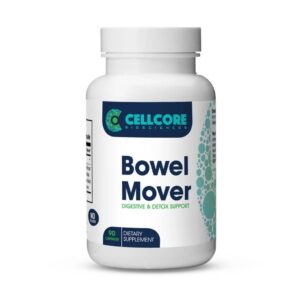7 Overlooked Causes of Constipation and How You Can Fix It
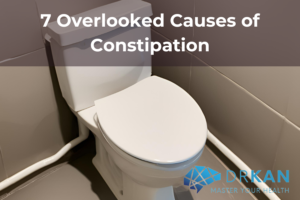
If you are taking laxatives and supplements for constipation but still feel backed up, or you can’t go without them, there is a reason. In fact, there are 7 reasons!
In this article, you’ll learn the 7 overlooked causes of constipation that laxatives and supplements don’t fix. Read until the end where I show you how to fix it.
What Is Constipation?
Constipation can really weigh you down, and make you feel all backed up, toxic, and sluggish.
Normally, we should have bowel movements daily from 1-3 times per day.
Constipation generally means passing fewer than three stools a week or having a difficult time passing stool.
Doctors are actually telling patients that having bowel movements every other day is normal and you don’t worry about it, because so many people are not having daily bowel movements. But let me tell you that this is actually not normal.
Yes, it is a very common problem. But common doesn’t make it normal! Heart disease and cancer are common, but they are not normal. It’s an epidemic. The reason for this is most people are treating the symptoms while ignoring the root cause–or, the 7 root causes, actually!
Symptoms of constipation include:
- Fewer than three stools a week
- Hard, dry or lumpy stools
- Straining or pain when passing stools
- A feeling that not all stool has passed
- A feeling that the rectum is blocked
Constipation can definitely cause discomfort, but it can also lead to toxicity, where toxic substances from the fecal matter get reabsorbed and make you feel sick.
Normal Physiology of Bowel Movements
Let’s rewind for a second and understand the normal physiology of bowel movement first.
Digestion goes from north to south. So digestion starts all the way up in the brain and vagus nerve (you’ll learn more about this below).
Once food is chewed and swallowed, it travels down the GI tract through peristalsis – which is involuntary contraction and relaxation of intestinal smooth muscles.
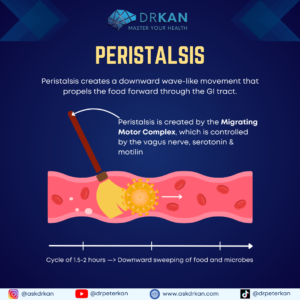
Peristalsis creates a downward wave-like movement that propels the food forward through the GI tract.
This distinct pattern of electromechanical activity of the smooth muscles of the GI tract can be measured and is called the migrating motor complex.
This is usually observed during periods between meals when you have not eaten for several hours.
The migrating motor complex cycles through every 1.5 to 2 hours, and it serves a housekeeping role and sweeps residual undigested material and microbes down the GI tract.
This movement can be heard on abdominal auscultation with a stethoscope. Or you can simply rest your ear on your loved one’s tummy and hear the gurgling sound every few seconds.
One of the signs that is a clue for decreased GI motility is reduced frequency of sounds on abdominal auscultation.
As food goes through the GI tract, nutrients are digested and absorbed with the help of secretions such as enzymes, HCL, bile.
The remaining undigested food matter enters into the colon, where it is further acted on by the gut microbiota, which produces various metabolites and vitamins such as vitamin K, biotin, and short chain fatty acids.
Finally, the fecal content reaches the rectum, activates stretch receptors in the rectum which stimulates sacral parasympathetic nerve fibers to create urge and bowel movement.
Now, you can hold the bowel movement with voluntary contraction of the internal and external anal sphincters until you get to the commode.
But eventually the urge will override the voluntary contraction and you must go or risk an accident.
Some people don’t have good neural and muscular control of the rectum due to aging and other health conditions, and this results in bowel incontinence.
Obvious Causes of Constipation to Look at First
Some causes of constipation are more obvious than others. Below are the more commonly known constipation causes to watch out for.
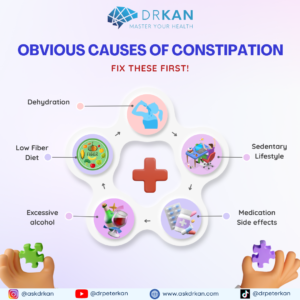
Dehydration
Stool formation requires hydration, otherwise you get rock hard stools that can be uncomfortable to pass. Some patients call it rabbit pellets, but these are definitely not Easter eggs! So dehydration is a common cause of constipation.
Low Fiber Diet
Dietary fiber helps to form the bulk of the stool, and it also helps to absorb the moisture. Not to mention the fiber also feeds the beneficial bacteria in your colon, which then produces beneficial metabolites such as short chain fatty acids that help to regular intestinal function. The Standard American Diet is famously known for lacking in fiber, which is another common cause for constipation.
Sedentary Lifestyle
Lack of activity, especially exercise, is one of the main factors that lead to constipation.
Basically, the colon responds to activity. Good muscle tone in general is important for regular bowel movements. The abdominal wall muscles and the diaphragm all play a crucial role in the process of defecation. If these muscles are weak, they’re not going to be able to do the job as well.
Aerobic exercise, which increases both heart and breathing rates, causes natural movement of the intestines and makes passing stools quicker and easier.
Recent studies suggest that exercise can enhance the number of beneficial microbial species, enrich the microflora diversity, and improve the development of commensal bacteria. All these effects are beneficial for the host, improving its health status. (1)
Excessive Alcohol Intake
Alcohol consumption can lead to constipation due to dehydration and slowing of intestinal emptying.
Alcohol is a poison for nerve cells. When you poison the nerve cells in the intestine responsible for motility, you replace peristalsis with paralysis of the muscles involved in bowel movement, causing constipation.
Alcohol is also a great antiseptic. So it does a great job of wiping out your beneficial gut bacteria. It turns out that the beneficial gut bacteria are important in maintaining healthy intestinal motility via the production of various bacterial poop (metabolites) they produce, such as short chain fatty acids like butyrate.
Most studies on heavy alcohol consumption show that it alters the gut microbiome diversity and produces dramatic change in the relative abundance of certain opportunistic microbes, causing dysbiosis and inflammation in the gut, as well as leaky gut. (2)
Medication Side Effects
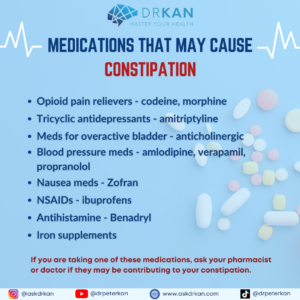
There are medications that can cause constipation as one of their side effects. These include:
- Opioid pain relievers – codeine, morphine
- Tricyclic antidepressants – amitriptyline
- Meds for overactive bladder – anticholinergic
- Blood pressure meds – amlodipine, verapamil, propranolol
- Nausea meds – Zofran
- NSAIDs – ibuprofens
- Antihistamine – Benadryl
- Iron supplements
If you are constipated, check to see if you are taking one of these medications that can be part of the reason for your constipation.
7 Overlooked Causes of Constipation
Now, there are other causes of constipation that are often overlooked in conventional and even alternative medicine. In my experience of helping over six thousand clients overcome their chronic conditions with functional medicine, these are the 7 overlooked causes of constipation that you and your doctor may not have considered.
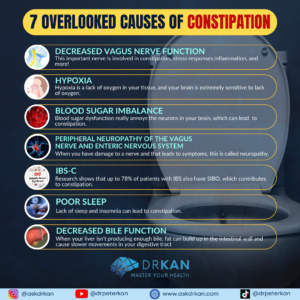
1. Decreased Vagus Nerve Function
This should seem obvious since the vagus nerve is the primary parasympathetic nerve in charge of digestion. But most healthcare practitioners overlook this important cause of constipation.
Decreased vagus nerve function typically will lead to more than just constipation, since the vagus nerve has a hand on so many different bodily functions. You may also experience decreased digestive capacity for proteins, carbs, and fats, leading to gas, bloating, indigestion. You may have difficulty with swallowing, choke on food or liquids easily, and have an increased stress response due to unopposed fight or flight response. You may also get SIBO or Candida overgrowth simply due to lack of downward motility that normally sweeps the bugs down and out with bowel movement. You may also have more inflammation, due to the vagus nerve’s role in dampening inflammation through the inflammatory reflex.
Check out this video on the vagus nerve where I take you on a deep dive into this important and fascinating nerve.
2. Hypoxia
Hypoxia is a lack of oxygen in your tissue. The primary sources of fuel for all neurons, whether in the brain or the vagus nerve, are oxygen and glucose. Your brain is extremely sensitive to lack of oxygen. After just a few minutes without oxygen, such as in the case of drowning, you can get irreversible brain damage and die.
Oxygen comes from the air you breath, then it is carried by your red blood cells and distributed through perfusion of blood.
So any problem that interferes with breathing will lead to hypoxia, which is low oxygen in the body. Common breathing problems include sleep apnea, COPD, shallow breathing, problems with your red blood cells (such as anemia), problems with perfusion (such as low blood pressure or poor circulation). This will cause the vagus nerve to falter and can lead to various digestion issues, including constipation.
3. Blood Sugar Imbalance
Your vagus nerve (and all nerve cells) as well as the smooth muscle in your intestine (that drives the migrating motor complex) all require fuel to produce the energy needed for motility and digestion. About 10% of your total caloric intake is used to digest food (this is the Thermic Effect of Food).
Blood sugar dysfunction really pisses off your neurons. A state of low blood sugar compromises fuel delivery. It’s like driving the car with the low fuel light on! It can be very anxiety provoking. That is why you get hangry, irritable, forgetful, and can’t focus when you have low blood sugar.
High blood sugar is just as bad, but with a double whammy. High blood glucose leads to insulin resistance, so the glucose can’t get into your cells, leading to low fuel inside the cell.
Meanwhile, all the glucose that can’t get into the cell is floating around in your bloodstream, clumping together and binding to your tissue and causing severe inflammation in a process called glycation.
Your delicate vagus nerve simply can’t withstand the onslaught of lack of fuel and inflammation. This can lead to constipation.
4. Peripheral Neuropathy of the Vagus Nerve and Enteric Nervous System
Just like any other neuron, the vagus nerve is a delicate structure that is sensitive to inflammation and damage. In fact, this is true for your whole enteric nervous system, which is made up of all the sensory and motor nerves that innervate the gut. All of these together are dubbed the second brain due to sheer quantity of neurons.
When you have damage to a nerve and that leads to symptoms, this is called neuropathy. This is the case whether it’s due to physical injury, inflammation, diabetes, mercury poisoning, etc.
Most people think of neuropathy in the context of diabetic peripheral neuropathy, where you get numbness and tingling in your extremity.
But you can just as easily have neuropathy of the vagus nerve.
The problem is neuropathy of the vagus nerve doesn’t produce nice and neat symptoms of numbness and tingling that you can feel or easily test on a physical exam.
It usually starts with subtle whole body symptoms that can seem confounding and unrelated. It takes a doctor with a trained eye and experience to separate the tree from the forest.
5. IBS-C
Now, this is just a label that describes your symptoms. And a label is useless and meaningless unless you know what is causing the symptoms.
Research shows that up to 78% of patients with IBS also have SIBO. (3)
SIBO can produce methane gas, which decreases the ileal and colon transit time and raises the amplitude of contraction, slowing peristalsis, and resulting in constipation. (4)
6. Poor Sleep
Lack of sleep and insomnia can lead to constipation. In a multicenter 3-year cross-sectional study of shift workers shows an association between insomnia and constipation. (5)
In another observation study of 11,785 people, it was shown that males with short duration of sleep had more constipation, while females with longer duration of sleep suffered more constipation. (6)
This could be due to higher prevalence of hypothyroidism in females, and hypothyroidism symptoms include fatigue and needing excessive amounts of sleep to function. By the way, one of the main symptoms of low thyroid function is also constipation.
Sleep loss also disrupts your gut microbiome, which can lead to downstream problem of constipation. (7)
7. Decreased Bile Function
Bile is an important player in breaking down fatty nutrients. Liver produces bile and the gallbladder stores it for release with fatty food intake.
When your liver isn’t producing enough bile, or it is too thick to flow freely (sludgy), or due to lack of gallbladder contraction (decreased vagus nerve function), fat can build up in the intestinal wall and cause slower movements in your digestive tract, therefore causing constipation.
As the old saying goes, you are what you eat. But then my mentor taught me you are what you absorb. Now I want you to know that you are what you don’t eliminate! Whatever junk you don’t get rid of, that will be reflected in the health or lack of health you experience.
Constipation Solutions
So what are things you can do to improve your bowel regularity so you can eliminate properly and feel great?
Supplements for Constipation
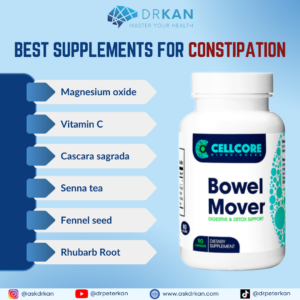
Let me suggest to you to identify the root cause of the constipation, rather than just asking what pill to take. Because different causes will require different solutions. Taking a laxative may get you to go, but the root cause of why you are constipated will persist and then you become dependent on the laxative without actually improving function.
Now, it’s not wrong to take a supplement to help you go. Because if you gotta go, you gotta go.
1. Magnesium & Vitamin C for Constipation
So things like high dose magnesium and vitamin C can both induce bowel movement. Gradually increase dose until you get to desired bowel regularity and form. Some people can tolerate a lot, while others can get loose stool and diarrhea at the same dosage.
2. Herbs for Constipation
Herbal compounds such as senna tea, cascara sagrada, fennel seed, rhubarb root can have a laxative effect and are often used in supplements or tea to improve constipation.
3. My Favorite Constipation Supplement: Bowel Mover
Bowel Mover is a herbal product that I have used successfully with my clients to improve regular bowel movements. It is not a laxative, but rather a prokinetic which promotes intestinal motility. Start with 1 cap 1x/day and increase until you get to the desired bowel regularity and movement.
Addressing the Root Cause of Constipation
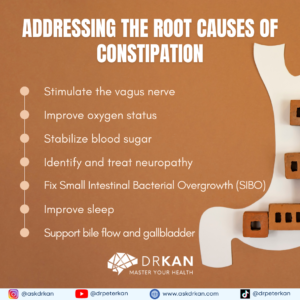
What is more important than supplements, is to address the root cause. So start with the obvious solutions. Improve hydration, increase fiber intake, reduce alcohol, and get good sleep.
Once you have these foundations in place, then identify whether these 7 overlooked causes are in play for you. You may need to work with a qualified functional medicine practitioner to identify some of these causes with detailed history, consultation and lab tests.
Once you have identified a possible, or multiple root causes, here are some tips on how to correct them.
1. Vagus Nerve Malfunction
Vagus nerve function can be improved with vagal exercises, such as gagging, gargling and humming. Deep breathing exercises and meditation can also help. I have a separate video that goes in detail on how to stimulate the vagus nerve. You can check it out here >>
2. Hypoxia
If you have anemia as identified on a blood test, you will want to know what type of anemia and what caused it. It can be due to iron deficiency, low stomach acid status, heavy menstrual bleed, fibroids, malabsorption, B12 deficiency, autoimmune disease, or chronic inflammation.
Low blood pressure is a common cause of poor perfusion. Consider adding sea salt to food, or 1 tsp of sea salt to 1 liter of water. You may do this 1 or 2 times per day and check your blood pressure to see if it gets up to normal range close to 120/80.
3. Blood Sugar Imbalance
Blood sugar problems come in 3 flavors: low blood sugar, high blood sugar, and mixed pattern. Low blood sugar folks benefit from eating small frequent meals to keep blood sugar from tanking. High blood sugar folks may benefit from intermittent fasting and a low carb diet. Mixed patterns would benefit from eating consistently while eliminating refined carbs and sugar and increasing fiber intake.
4. Peripheral Neuropathy
If you suspect peripheral neuropathy, you will definitely want to work with a practitioner. It’s important to identify the root cause of neuropathy, which can be diabetes, autoimmune, or environmental exposure.
5. IBS-C
If you suspect SIBO, a low FODMAP diet may help to reduce symptoms by not feeding carbs and fibers that feed the bacteria. Antibiotics or natural antimicrobial compounds such as berberine, sweet wormwood, Uva Ursi, garlic extract, oregano oil, etc may be needed to decrease pathogen load. Low vagus nerve function is often present in SIBO, because the low motility is not sweeping the bacteria down the GI tract, thus allowing the bacteria to stay in the GI tract longer and ferment and overgrow.
6. Poor Sleep
There can be many causes for poor sleep, including but not limited to: blood sugar imbalance, adrenal gland dysfunction, inflammation and pain, stress, blue light exposure at night, not enough light exposure during the day, sedentary lifestyle, partner who snores, you snore, hot flashes due to menopause, and simply staying up too late and not having a consistent sleep schedule. It’s important to identify the cause so you are fixing the right problem.
My recommendation is to start with controlling light exposure, since that is the biggest influence over your circadian rhythm. Get outdoors and exposed to sunlight during the day, and limit screen time at night.
7. Decreased Bile Function
If you suspect bile issues, you can support liver and gallbladder with natural compounds such as milk thistle, dandelion root, taurine, inositol and ox bile. These compounds are called cholagogues that facilitate bile flow, thinning of the bile, and gallbladder contraction.
If your gallbladder has been removed, these above-mentioned cholagogues may still be very useful, because the bile is still being produced in the liver, and you still want to create good bile flow.
Conclusion
Now you know the 7 overlooked causes of constipation, you can begin to look for them and get on the right track of solving them. Let me know in the comments which one of these overlooked causes you may be struggling with!
Want Personalized Support?
We offer Zoom consultations to help you identify the root cause of constipation and other chronic issues. We order functional medicine lab tests for you and design a customized eating plan, supplementation plan and detoxification plan to optimize health while reducing the dependency on medications.
If you’re struggling with chronic symptoms, and looking for a root cause approach using a natural and holistic approach, please visit https://askdrkan.com/get-started for more information and to get started on the path to wellness.
